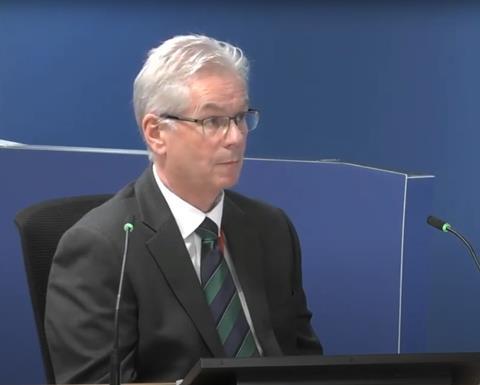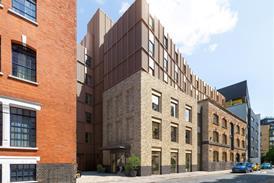Philip Heath emailed colleagues insulting a consultant that questioned whether product was safe to use
A technical manager at Kingspan said that a facade engineering consultant could “go f’#ck themselves” after they raised doubts about the fire safety of a combustible insulation product later installed on Grenfell Tower, the inquiry has heard.
Philip Heath made the comments in a 2008 email to a friend after the specialist, Wintech, had advised contractor Bowmer & Kirkland that Kingspan’s Kooltherm K15 insulation was not suitable for a high-rise project.

The contractor had sought assurances that the insulation was safe for use on a tower scheme it was working on, as the test report being used to market the product only applied to the specific set-up which was tested.
Heath replied that K15 was “classified as class 0, or low risk,” but Bowmer & Kirkland was not satisfied and had replied: “You have not substantiated … on what basis the Kooltherm K15 is suitable for buildings over 18m?”
Heath forwarded this email to a friend, adding: “I think Bowmer & Kirkland are getting me confused with someone who gives a dam. I’m trying to think of a way out of this one, imagine a fire running up this tower !!!!!…!!!! Any ideas…?”
Bowmer & Kirkland had then sought advice from Wintech consultant Greg Sinclair, who told the contractor: “Kingspan keep repeating that the product…is suitable for use in buildings over 18m. What they fail to say is that it is suitable only in the configuration tested.”
When Wintech emailed Heath asking for further evidence that the insulation was safe for use on buildings taller than 18m, Heath told colleagues in an internal email: “Wintech can go f’#ck themselves, and if they are not careful we’ll sue the a’#se of them [sic].”
Inquiry barrister Kate Grange QC asked Heath: “Can you explain why you wrote that, given Wintech were giving entirely accurate advice to their customers?”
Heath, who still works at Kingspan, replied: “It was totally unprofessional and on reflection I wouldn’t have said that. I think it was frustration we were going around in circles with them.”
He added: “We were just going around in circles and a bit of frustration came out there on a Friday.”
Asked by Grange if his responses “reflected a culture within Kingspan at the time?” he replied: “No, I don’t believe so. Like any organisation you have your good times and difficult times.” He added: “I think we did take life safety seriously. We provided Wintech with the data we had for them to make the appropriate analysis.”
He said that his earlier comments in an email forwarded from Bowmer & Kirkland to a friend were made because his friend had been terminally ill at the time and he was “just trying to lighten his load and lighten my load”.
He apologised for the content of the email and added that he was trying to “to show him what was going on at the time”.
The inquiry has already heard how K15 had been marketed as suitable for a wide range of applications on buildings above 18m, despite only passing a 2005 fire test in a specific rig using a cement particle board cladding.
The inquiry has heard how firm then changed the chemical composition of the product, which was now dubbed “new technology” K15, but had continued to use the test report of the older version of the product to classify it as safe for high-rise projects.
When the “new technology” K15 was tested in December 2007, it turned the test rig into a “raging inferno” which had to be extinguished by testing house the Building Research Establishment (BRE) out of fears that it would endanger the laboratory.
Heath admitted that “with hindsight” the product should have been withdrawn from the market after this test failed.
The product was sold for more than 14 years before Kingspan sent a letter to the BRE in October this year, which was seen by the inquiry, claiming that it was “now of the view” that the product being sold was different to what had been tested.
But former Kingspan technical product manager Ivor Meredith told the inquiry last week that it had been “common knowledge” at the firm from 2006 onwards that the test report used to market the newer K15 as safe was from the older K15.
The inquiry also heard last week how Kingspan had threatened the National House Building Council, a building control body, with an injunction in February 2015 after it said it would start warning clients that K15 was not suitable for use on buildings above 18m unless it used the exact system which had passed the 2005 test.
In 2016, the NHBC published guidance confirming that K15 could in fact be used on buildings above 18m.
The insulation also received certification for use on high-rise buildings by the Local Authority Building Control, which wrongly said that K15 held the status of limited combustibility needed for use above 18m.
The insulation was one of those used in the cladding system installed as part of Grenfell Tower’s refurbishment, which the first phase of the inquiry has found was the primary cause of the spread of the fire which killed 72 people in June 2017.
The inquiry continues.















